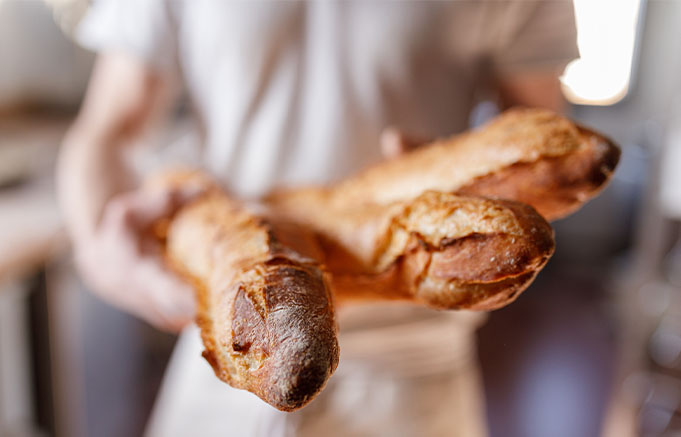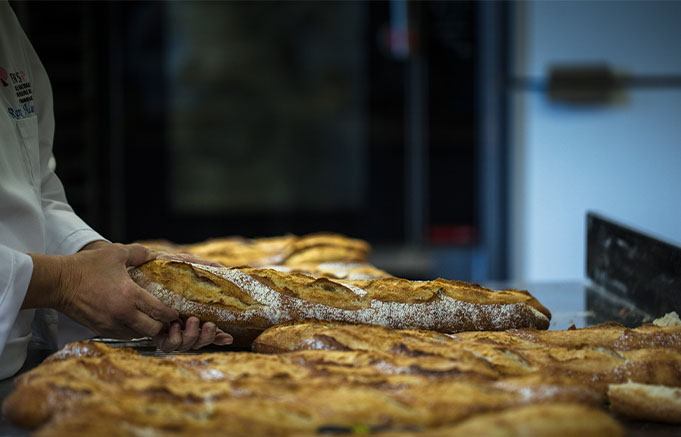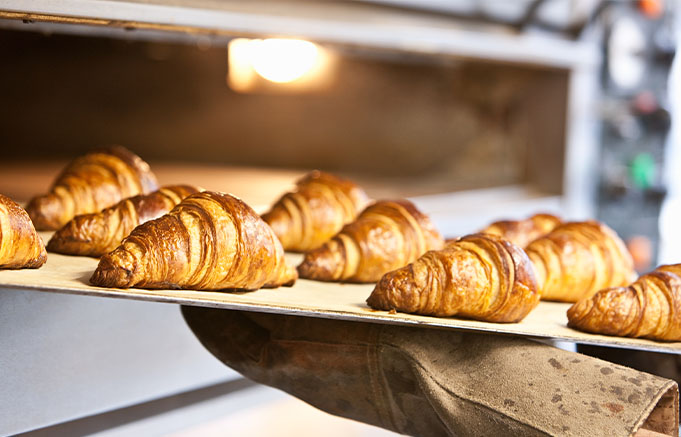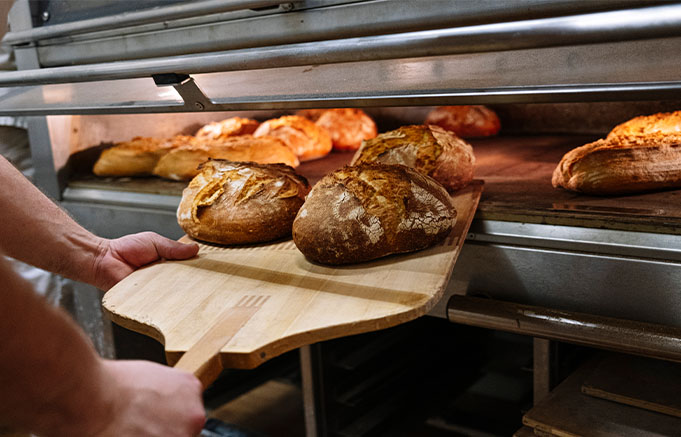How to start a bakery that will rise to all occasions

If you love baking and pastry arts, you've probably thought about the idea of opening your own bakery. Many of us love the idea of starting a business that we're really passionate about, but it can be intimidating to actually take that leap. However, starting a bakery doesn't have to be complicated, especially if you have the right knowledge, qualifications, and skills to support you.
In this article, we'll go over the main things to consider when you're looking at starting a bakery. If you're wondering how to start a bakery, then we'll cover everything from the best type of education to figuring out your market niche, so you'll have an invaluable guide for opening a bakery shop or starting a home bakery business.
What is a bakery?
Bakery is the term for any establishment that makes and sells baked goods. This can include bread, cake, biscuits, or pastries. A lot of larger food shops can have bakeries within them, but there are also outlets or businesses that only offer baked goods. Of course, there are many bakery types, and if you're looking at starting a bakery you'll need to decide what type of bakery you want to start.
Types of bakery
While bakeries all make and sell similar goods, there are numerous variations on this business type. Some of these will suit you more than others, so you need to consider what kind of business you want to open. Here are some of the most common bakery types.
- Retail bakery: This type of bakery is the type most people are familiar with. Retail bakeries sell goods directly to customers who come in, browse the displays, and choose the items they want to buy.
- Specialty bakery: There are many specialty bakery types you could consider, including patisserie, specialist bread makers, and more. With a specialist business, you could even look at becoming a chocolatier focusing on a combination of chocolate and baked items.
- Wholesale bakery: These sell goods to restaurants, hotels, grocery stores, and other businesses. This involves making large orders of specified goods. Most wholesale bakeries don't have a storefront, but some combinations of wholesale and retail bakeries do exist.
- Food truck or mobile bakery: If you want the fast-paced excitement of running a food truck, you could start a mobile bakery. This will usually be focused on items that people can grab on the go, but there are some specialist bakery trucks that cater weddings and other events.
- Cafe or bakery with dining space: This is a crossover between a bakery and a coffee shop, though most customers will expect a bakery cafe to have a wider choice of baked goods compared to a coffee shop.
- Home bakery business: There are many ways to run a home-based bakery business, including wholesale baking or making bespoke items to order, such as wedding cakes.

Why start a bakery?
Starting a bakery can lead to a really exciting and rewarding career. You get to set your own hours, work how you want to, and you can create your own delicious recipes. Plus, you can pick a business type that gives you lots of interactions with customers if you are a ‘people person’. Of course, if you're not sure about whether you want to start your own baking business, there are plenty of other culinary careers to choose from.
What qualifications do I need to start a bakery?
If you want to run a bakery, you'll need a range of capabilities, including management, financial skills, and business skills. You’ll also need general culinary skills and specialized baking skills. One of the best ways to get these is by studying baking and pastry making, to ensure that you have good knowledge of all the baking techniques you'll need.
World-class pastry and baking degrees
Our courses combine theoretical knowledge, practical workshops, and internships to provide the essential mix of culinary skills and business knowledge for starting your own bakery.
Bachelor's degree in baking and pastry arts
The importance of culinary education in starting a bakery
Whether you're looking at starting a home bakery business or starting a bakery in the heart of a city, you'll need to offer exceptional baked goods to stand out and maximize your profit. You'll probably find significant competition when you start competing in the bakery industry, so having specialist skills in the culinary arts can be a huge help. One of the best ways to get this culinary expertise is through studying at a culinary school in France, as France is a global leader when it comes to excellence in pastry and baked goods.
How to start a bakery business
If you think you're ready to start your bakery business, be sure to look at the checklists below to make sure you've considered all the important skills, planning stages, and requirements. Having a solid bakery business plan will help you become more likely to succeed.

Understanding the art and science of baking
Learning great baking techniques means understanding the science behind ingredients and how they react with each other. Essentially, baking is a form of chemistry, such as when you add yeast to make bread dough rise. The chemistry of baking can be quite complex, and some things you'll need to learn include the following.
- Baking techniques and methods: You'll need to know the basics as well as advanced techniques.
- Recipe creation and testing: You should be able to create and test new recipes to develop exceptional baked products.
- Perfecting your techniques: You need to make sure that you can bake perfect bread, cake, or pastries that are consistently excellent.
Defining your bakery concept
Some people know exactly what kind of bakery they want to create, but others might not be sure which direction is best. Either approach is fine, but during early planning, you'll need to decide on your business concept.
- Choose your niche: This could be a themed cafe, a food van for busy commuters, or a market stall.
- Identify your target market: Think about who will be your usual customers. Are you selling to companies or individuals? What demographic target audience are you aiming at?
- Name your bakery: A name conveys a lot, so you want something memorable but also unique and meaningful to your business.
Developing a business plan
Whether you're starting a home bakery business or planning a wholesale bakery, you'll need a business plan, which should cover the following.
- Conducting market research: Surveys can tell you what your customers need from your bakery. Be sure to study your competition too.
- Setting business goals: Having goals gives you targets to aim for, and helps you check that you're on the right path.
- Creating a financial plan: Financial management for bakeries is just as important as for any other business.
Choosing the right equipment and ingredients
You'll need to make sure that you have the equipment you need to make your main products quickly and to a high standard. You'll also need to look at ingredients and supply chains.
- Essential equipment for your bakery: This includes items like scales, blenders, tins and trays, decoration tools, refrigeration, and more. For larger bakeries, you'll likely need industrial equipment.
- Selecting quality ingredients: It's easier to run a successful bakery if you use high-quality ingredients, though you'll need to figure out the important ingredients that are worth spending more on, to maximize resources.
- Finding reliable suppliers: You'll need to find wholesalers that can supply the amount and quality of ingredients you need. It's also worth considering backup plans for buying ingredients in case your usual source has transport issues or can't supply your ingredients in time.

Legal requirements for starting a bakery business
One of the main things you'll need to consider when you start your own bakery is what type of business structure is right for you. If you're unsure what works best for you, you should seek legal advice.
- Sole proprietorship: This means that you own the business fully yourself.
- Partnership: A partnership might be right if you are opening a business with other people.
- LLC: A limited liability company is a common business structure, but the exact terms of this vary from country to country or even state to state.
- Corporation: A corporation is a legal entity that can borrow money and own assets.
You'll also need to consider licenses and permits for your bakery. The type of permits you need will depend on what type of business you are setting up and where you intend to trade.
Financing your bakery
You'll obviously need to think about financing your bakery. You'll need to make sure that you have a good profit margin on your products and you'll probably want to consider the following, too.
- Startup costs: Initial costs will be high if you need to start renting a property or buying equipment. You should also consider the costs of marketing, signs, and the up-front cost of stocking ingredients.
- Finding investors: With a solid business plan and profit projections, you may be able to find investors. Entrepreneurship training can help you learn how to approach investors.
- Applying for loans: Alternatively, you could start funding your bakery through loans from banks or other financiers.
- Equipment financing: If you cannot afford to buy large equipment up front, you can often finance or lease equipment through specialists.
- Track expenses: Throughout the whole process, you need to track expenses, outgoings, and revenue.
- Work out product prices: You need to make sure you price your products sensibly. The price should cover all the expenses of making it, the general costs of running the bakery, and salaries.
Setting up operations for your bakery
The practical side of setting up a bakery includes several aspects.
- Securing commercial space: Renting or purchasing a suitable shop or warehouse.
- Acquiring equipment: You can either buy or lease equipment from specialists
- Finding food handlers: You'll need to hire people who are proficient at food hygiene, food handling, customer service, and of course baking. You might want to look into team management for bakeries.
- Certificates: You might need to get food handling or hygiene certificates to run your bakery.
Promoting your bakery
Marketing for bakeries is important to make sure that you get noticed by your customer base.
- Develop your brand identity: Branding will be vital to help customers remember you.
- Develop voice and tone: You need to carefully consider how your brand looks and sounds to potential customers.
- Create a marketing plan: Plan your marketing, especially in the early days when it's most important.
- Establish your online presence: A mobile-friendly, SEO website is now standard for most businesses.
- Use social media platforms: Social media engagement is expected and can help you reach more customers.
- Advertising campaigns: Try running specific campaigns based on certain products or special offers.

How much money do you need to start a bakery?
The start-up costs will depend on what kind of bakery you want to open. A small at-home bespoke bakery might only cost €1,000 to open, while a retail bakery could be anywhere from €10,000 up to €50,000.
Is owning a bakery profitable?
How profitable your business will be will depend on how successful you are. If you find a popular niche and deliver good service to your customers, running a bakery can be a very lucrative occupation.
Starting a bakery: conclusion
If you're wondering how to start a bakery business, simply note the steps on the lists above to get yourself started and become a business owner. Running a bakery can be a very rewarding path for many people, and it's a great goal to have in your baking career. If you're wondering how to get the skills and experience you need to get started, try our baking and pastry arts courses, which include expert baking techniques as well as business and management skills.


